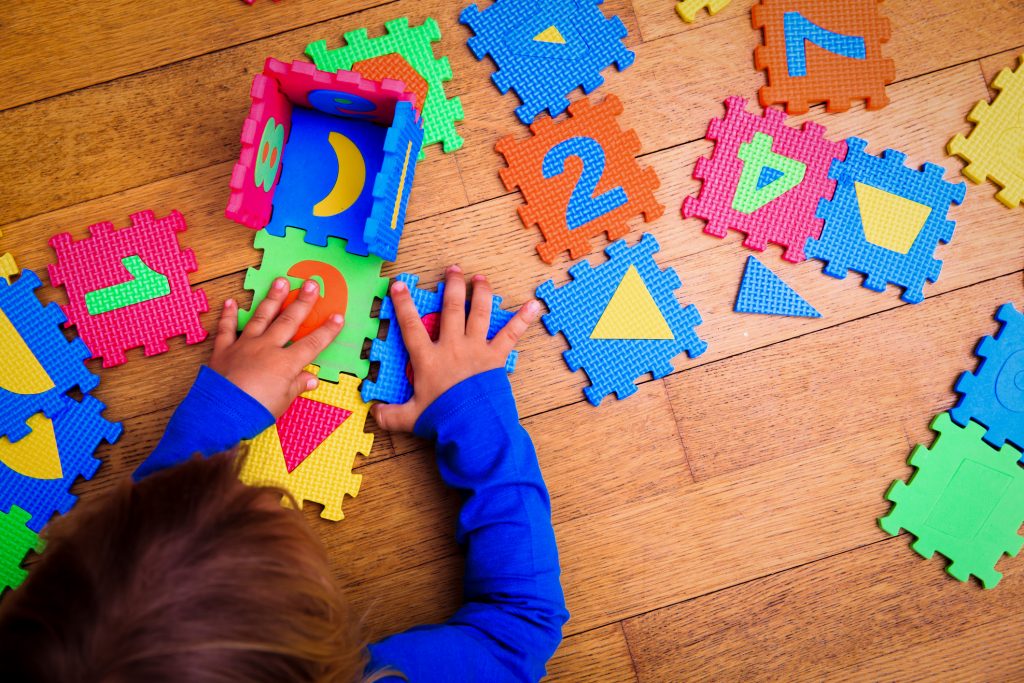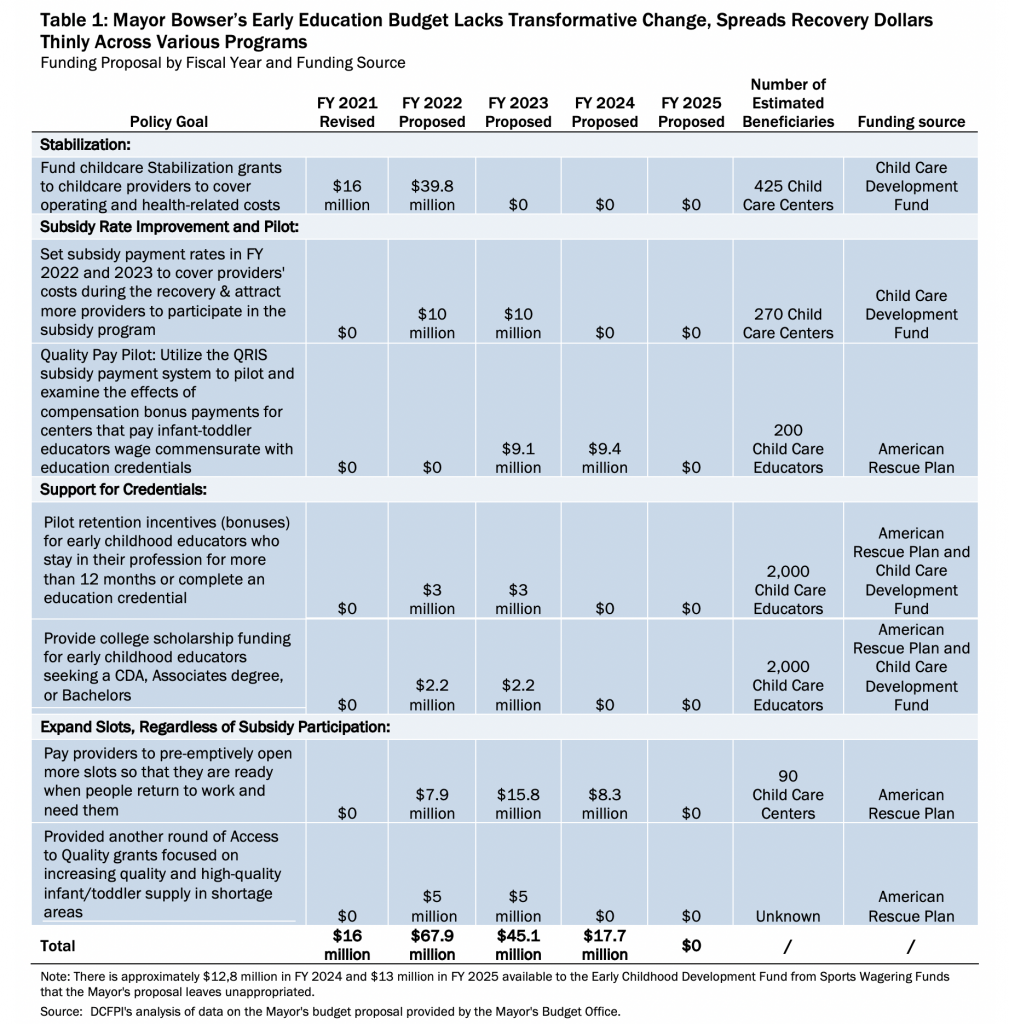Mayor Bowser missed an unprecedented opportunity to combine federal and local funding to make bold, transformative investments that would strengthen the District’s early childhood system and ensure a just recovery for all children, families, and early learning programs. Her fiscal year (FY) 2022-2025 budget for early education fails to take transformative steps toward a high-quality, equitable, and sustainable early education system—as envisioned in the Birth to Three for all DC Law, which remains largely unfunded since its passage in 2018. The Mayor’s proposal uses nearly $147 million in American Rescue Plan (ARP) and other federal funding through FY 2025 to make short-term investments sprinkled across a range of programs (Table 1).
The DC Council must deliver on its promise to ensure equity begins at birth by making a local, long-term investment in child care and the Birth to Three law to support children, early educators, and the DC economy.
Proposed Budget Stabilizes Child Care Programs but Lacks Strategic Vision
The Mayor’s proposed budget allocates federal dollars to stabilize the child care sector, which has been hard hit by the pandemic. The stabilization grants would cover operating and health-related costs from the pandemic for 425 child care programs, totaling $16 million in the proposed revised FY 2021 budget and $40 million in FY 2022, with no funding thereafter. Early learning programs have faced deep financial hardship throughout the pandemic, as the health crisis increased business costs and sank revenues. Quickly administered stabilization grants will be critical to getting these small businesses back on their feet.
While the Mayor’s proposal allocates $10 million of ARP funding in FYs 2022 and 2023 to support higher subsidy reimbursement rates for child care providers, the investments are non-recurring and do not fully meet the Under 3 DC coalition’s $60 million recurring ask to pay providers and teachers more fairly. Federal funds can provide much-needed short-term relief, but will not ensure fair, livable wages for the many early educators—primarily Black and brown women—earning lower incomes than their peers in public education. Early educators are paid 67 cents for every dollar public school educators earn.
Rather than making long-term, local investments in equal and fair compensation, the Mayor allocates $18.5 million across FY 2023 and 2024 to pilot and examine the effects of bonuses for programs that pay infant-toddler educators wage commensurate with education credentials. Retention isn’t something that the city needs to test: higher pay attracts a more skilled workforce, reduces turnover, and connects to better child outcomes, research shows. Educators cannot wait another year for fair pay.
Proposed Budget Spreads ARP Dollars Thin, Limiting their Impact
The Mayor’s budget sprinkles federal funding across several other short-term investments, including:
- $6 million across FYs 2022 and 2023 to pilot a program that would incentivize child care educators with bonuses of up to $1,500 if they stay in their profession for 12 months or complete an education credential.
- $4.4 million across FYs 2022 and 2023 to provide additional college scholarship funding for 2,000 early childhood educators seeking a CDA, Associates degree, or Bachelors degree.
- $32 million for Back2Work Childcare grants for 90 child care programs that closed during the pandemic to pre-emptively open more slots so that providers are better prepared to meet demand when people return to work.
- $10 million in an additional round of Access to Quality (A2Q) grants focused on increasing quality and high-quality child care supply in shortage areas.
The District was short on its supply of early education slots before the pandemic, and while these funds are critical for recovery, they are non-recurring investments and, without local, permanent investment, will not ensure sustainable child care expansion and support.
Proposed Budget Falls Short of Advocates’ Requests for Health Programs
The proposed budget doesn’t include the Under 3 DC Coalition’s ask for $675,000 in recurring funding to expand Healthy Futures, a mental health consultation program that builds the capacity of child care staff and families to respond to challenging behaviors and mental health needs in children ages 0-3. Instead, the proposed budget uses federal funds to add a small increase of just $480,000 to pilot a program under the same name that will provide needed on-site mental health services, including direct clinical support to children at eight early learning programs in the District that participate in the child care subsidy program. While we are awaiting more information about this proposed pilot, we know that clinical services are a needed addition to the early childhood behavioral health toolkit. However, the addition of clinical services must accompany continued expansion of Healthy Futures’ valued and sought-after behavioral health consultation program that provides training and technical assistance to program staff and families to identify and respond to children’s social-emotional needs.
One Birth to Three enhancement completely missing from the Mayor’s budget is funding for Healthy Steps. The program integrates a licensed child development health professional in pediatric primary care settings to help parents adapt to life with a new baby and get connected to infant-toddler resources that help families thrive. The Birth to Three for All DC law calls for $300,000 in additional recurring local investments in Healthy Steps to expand to one additional pediatric primary care site in Wards 5, 7, or 8 each year. To date, the District has not lived up to this promise, providing just $600,000 in recurring funding and $300,000 in non-recurring funding since the law passed in 2018. And although the proposed budget sustains home visiting programs administered through the Department of Health, it fails to renew $310,000 for the Child and Family Services Agency’s home visiting programs. These programs serve specialized populations, including fathers, parents who are returning citizens, and families facing circumstances that increase their risk for child abuse and neglect.
While the Mayor’s proposal supports advocates’ ask to sustain flat funding for Birth to Three law programs Help Me Grow and the Lactation Certification Preparatory programs, its failure to fully fund Healthy Futures, home visiting, and Healthy Steps limits the supports available to the one-third of the District’s infants and toddlers living in households with low incomes that have experienced more pandemic-related stresses than most DC families.
DCFPI and DC Action co-authored this blog.


